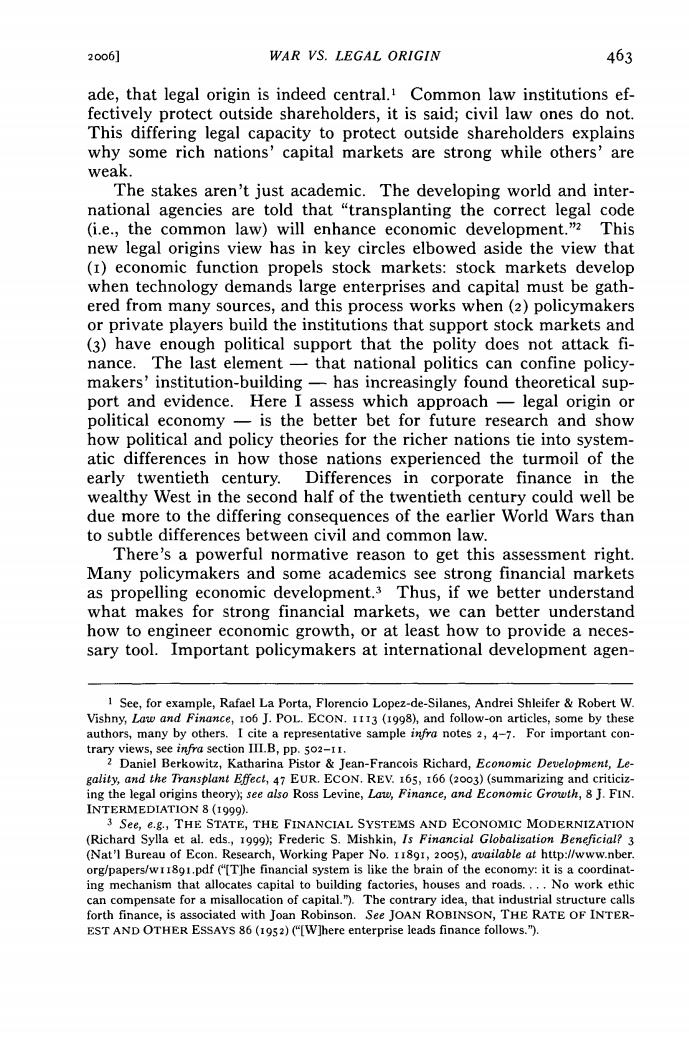正在加载图片...

20061 WAR VS.LEGAL ORIGIN 463 ade,that legal origin is indeed central.Common law institutions ef- fectively protect outside shareholders,it is said;civil law ones do not. This differing legal capacity to protect outside shareholders explains why some rich nations'capital markets are strong while others'are weak The developing world and inter natioma aencies are to haransplanting the correct legal cod (i.e.,the common law)will enhance economic development." new legal origins view has in key circles elbowed aside the view that (1)economic function propels stock markets:stock markets develop when technology demands large enterprises and capital must be gath- ered fr any so and th proce works when (2)polic ymaker or private players bu ld the institutions that support stock markets an (3)have enough political support that the polity does not attack fi- nance.The last element-that national politics can confine policy- makers'institution-building-has increasingly found theoretical sup- port and evidence.Here I assess which approach-legal origin or olitical e the better bet for uture research and shov olitical and policy th or the richer natic s tie into nations experienced the turmoil of the early twentieth century. Differences in corporate finance in the wealthy west in the second half of the twentieth century could well be due more to the differing consequences of the earlier World Wars than to subtle differences bet civil and co n la The re's a po owerful normative assessm ent right Many policymakers and some academics see strong financial markets as propelling economic development.3 Thus,if we better understand what makes for strong financial markets,we can better understand how to engineer economic growth,or at least how to provide a neces- sary tool. Important policymakers at international development agen a Fl Andrei shleifer robert w Vishnye.1o6 1.PoL.ECoN.I()and follow-on articles.ombte authors,many other repre sentative sample infra notes 2,4-7.For important con traDnenPijean-Francois Richard,m gality,and the Transplant Efect,47 EUR.ECON.REV. 165,166(2oo3)(summ zing and ERMEDIATION &C 5eea0K055 See,6.g,THE STATE,THE FINANCIAL SYSTEMS AND ECONOMIC MODERNIZATION (Richa 1999i Beneficial? org/papers/wpdf he financial system is like the brain of the ecor ing mechanism that allc tes capital to building factories,hou an roa No work et C IOAN ROBINSON.THE RATE OF INTER- EST AND OTHER ESSAYS 86(1952)("[W]here enterprise leads finance follows.). WAR VS. LEGAL ORIGIN ade, that legal origin is indeed central.' Common law institutions effectively protect outside shareholders, it is said; civil law ones do not. This differing legal capacity to protect outside shareholders explains why some rich nations' capital markets are strong while others' are weak. The stakes aren't just academic. The developing world and international agencies are told that "transplanting the correct legal code (i.e., the common law) will enhance economic development."2 This new legal origins view has in key circles elbowed aside the view that (i) economic function propels stock markets: stock markets develop when technology demands large enterprises and capital must be gathered from many sources, and this process works when (2) policymakers or private players build the institutions that support stock markets and (3) have enough political support that the polity does not attack finance. The last element - that national politics can confine policymakers' institution-building - has increasingly found theoretical support and evidence. Here I assess which approach - legal origin or political economy - is the better bet for future research and show how political and policy theories for the richer nations tie into systematic differences in how those nations experienced the turmoil of the early twentieth century. Differences in corporate finance in the wealthy West in the second half of the twentieth century could well be due more to the differing consequences of the earlier World Wars than to subtle differences between civil and common law. There's a powerful normative reason to get this assessment right. Many policymakers and some academics see strong financial markets as propelling economic development.3 Thus, if we better understand what makes for strong financial markets, we can better understand how to engineer economic growth, or at least how to provide a necessary tool. Important policymakers at international development agen- 1 See, for example, Rafael La Porta, Florencio Lopez-de-Silanes, Andrei Shleifer & Robert W. Vishny, Law and Finance, io6 J. POL. ECON. 1113 (1998), and follow-on articles, some by these authors, many by others. I cite a representative sample infra notes 2, 4-7. For important contrary views, see infra section III.B, pp. 502-1 1. 2 Daniel Berkowitz, Katharina Pistor & Jean-Francois Richard, Economic Development, Legality, and the Transplant Effect, 47 EUR. ECON. REV. 165, 166 (2003) (summarizing and criticizing the legal origins theory); see also Ross Levine, Law, Finance, and Economic Growth, 8 J. FIN. INTERMEDIATION 8 (999). 3 See, e.g., THE STATE, THE FINANCIAL SYSTEMS AND ECONOMIC MODERNIZATION (Richard Sylla et al. eds., 1999); Frederic S. Mishkin, Is Financial Globalization Beneficial? 3 (Nat'l Bureau of Econ. Research, Working Paper No. 11891, 2005), available at http://www.nber. org/papers/win8 9 s.pdf ("[T]he financial system is like the brain of the economy: it is a coordinating mechanism that allocates capital to building factories, houses and roads .... No work ethic can compensate for a misallocation of capital."). The contrary idea, that industrial structure calls forth finance, is associated with Joan Robinson. See JOAN ROBINSON, THE RATE OF INTEREST AND OTHER ESSAYS 86 (952) ("[W]here enterprise leads finance follows."). 2006]